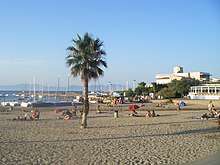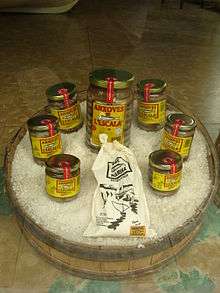L'Escala
Get in
By train
There is no train in l'Escala. The closest stations are Camallera and Flaçà (which is connected by bus with l'Escala). In case of going to Flaçà by train and later taking a bus, make sure to check the bus timetables beforehand since there are very few per day and you might end up having to wait in Flaçà for several hours or finding there are no more buses that day.
It is also possible to go with high-speed train to Girona and then taking a bus from Girona station to l'Escala.
By bus
L'Escala is connected by bus to several cities including Girona, Figueres and Barcelona. There are also buses from the Barcelona and Girona Airports. The timetable of those buses changes depending on the season so it is better to check beforehand on the website of Sarfa.
By car
The fastest way to reach l'Escala is through AP-7 highway exit 5.
Get around
L'Escala is not a big town and most of it is in a walkway distance.
During summer, there is a touristic bus (shaped as a steam train) called Carrilet that connects l'Escala from north to south and the other way around. It goes next to the sea most of the time and links several beaches. The price per trip is 2€.
L'Escala, as most Catalan cities and towns, is improving its bicycle infrastructure. Even though it is still far from perfect, moving around by bike is a good option.
See
- Old town: several beautiful small streets reserved for pedestrians.
- Empúries: it was a town founded in 575 BC by the Greeks and later occupied by the Romans. Today the ruins of that town can be visited, as well as a museum.
- Museu de l'Anxova i de la sal: museum about the history of l'Escala and its relation to the anchovies commerce.
Do

- Beaches: L'Escala, as most towns in Costa Brava, is well known for its beaches. Specifically in l'Escala, it is possible to find several kinds of beach, from rocky to long sandy beaches.
- Old town:
- La platja or Platja de les barques: the beach where most locals go. It is not very big and can get crowded during the peak season.
- La creu: some meters north there is a beach which most locals and visitors avoid due to it being rocky. It is a good spot to snorkel.
- Port d'en Perris: the most southern beach of the old town. It is a rocky beach but much more comfortable than La creu.
- Empúries: it includes several sandy beaches next to the Greek and Roman ruins.
- Riells: a long sandy beach with a seafront full of apparel shops, restaurants and ice-cream stands.
- Cala Montgó: the most southern beach in l'Escala.
- Old town:
- Snorkel: there are several good spots to snorkel in l'Escala, mostly in Empúries, La creu and Cala Montgó.
- Cycle: most of the seafront is now connected with bike lanes and bike paths, so it is easier than ever to go from one side to the other by bike.
Festivals and events
.jpg)
- PortalBlau: organizes several concerts during summer.
- Festa Major: held every year in early September, it includes dozens of activities specially for children.
- Festa de la Sal: a festivity the third Saturday of September.
Buy

Anchovies (called anxoves in Catalan) are the most typical product. The history of l'Escala is closely related to the fishing, preparation and selling of this fish. There are several shops, specially in the old town, which are focused on this product.
Carrer Marangues, popularly known as Carrer de les Botigues (Shops Street) has plenty of shops including apparel, a jewelry, a pastry and a supermarket.
The seafront of Riells is full of apparel shops.
Eat
The seafront of La platja and Port d'en Perris are full of restaurants with different types of cuisine, including Mediterranean cuisine, seafood, tapas and pizzerias.
Drink
Sleep
Stay safe
During summer, most beaches have a lifeguard during the day hours. They are responsible of helping anybody who gets hurt or drowns in the beach and raising a colored flag depending on the state of the beach. Don't swim if there is a red flag, it means it is not safe. Yellow flag means it might be dangerous to swim and green means it is safe. If there is no flag, apply common sense when swimming.